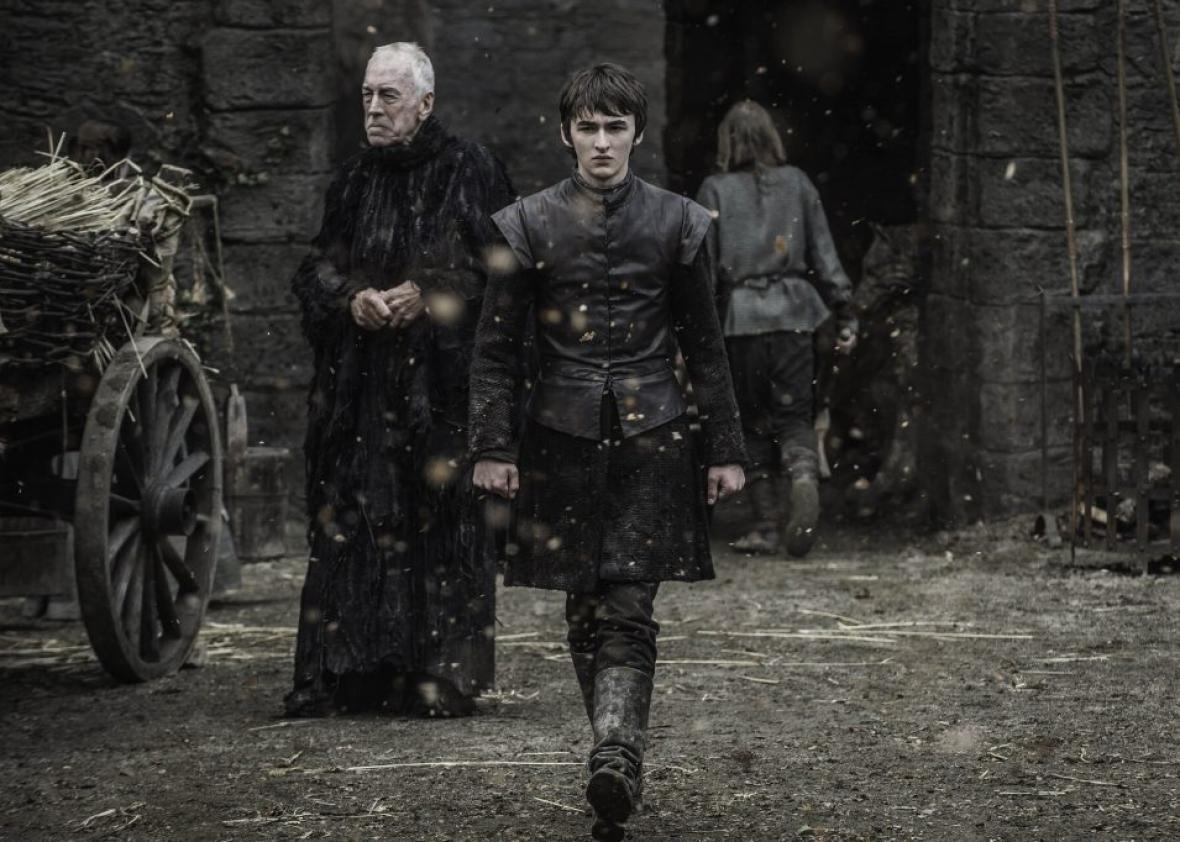On Game of Thrones, death is sudden. It is cruel and stupid, brutal and inevitable. But it has never been as heartbreaking as it was at the end of “The Door,” when the taciturn giant, Hodor (Kristian Nairn), gave his life so that Bran and Meera might escape.* George R.R. Martin doesn’t traffic in heroism, but if any character’s end qualifies as heroic, this one did.
From the beginning, and certainly since the moment Ned Stark’s head landed in a basket, Game of Thrones has conscientiously undermined the expectations of the sword-and-sorcery genre: This is a universe where good triumphs by chance, if at all, and heroes fall to treachery at every turn. As if being executed by a teenage tyrant weren’t enough, poor Ned Stark suffered further postmortem humiliation in “The Door,” via a bawdy history play where he was portrayed as a dimwitted, power-grubbing rube. His daughter, Arya, watched helplessly from the stands as her father’s reputation was ground into dust, just as she did on the day he was killed.
Hodor died for a reason—for the best of reasons. In the grand scheme of things, he’s a nobody, a loyal vassal known only by the single word he was capable of uttering. But even in a world where people ride dragons and come back from the dead, Hodor was unique. Despite his obvious limitations, Hodor became a fan favorite because of Nairn’s affable bearishness, but it was also because he was purely good, perhaps the last true innocent in the Seven Kingdoms, and the only character whose pure-heartedness didn’t make him a sucker. His death wasn’t shocking, like Ned’s beheading, or senseless, like the Red Wedding; he wasn’t a victim of his own arrogance or short-sightedness. But it cut deeper somehow, or at least called up an emotion I’m not used to associating with Game of Thrones. It made me sad.
In the final moments of “The Door,” we learned that Hodor’s death was inevitable, that it had, in a way, already happened. The moment he died was the moment he was born, the last words Hodor ever heard—Meera’s repeated cry to “Hold the door”—becoming the only words his traumatized brain could hold. It’s almost too tidy an explanation, verging on a cheap pun, and it indulges a strain of on-the-nose irony that the show has wisely steered clear of. But the moment works because it doesn’t just tell us how Hodor got his name. The discovery that Bran can not only witness the past but alter it shakes our understanding of Game of Thrones’ world as profoundly as the first-season moment when Daenerys Targaryen emerged from the flames, three newborn dragons in tow. Then, we learned that magic was real. With Hodor’s death, we learn that the past may be, as Bran’s three-eyed mentor insisted, written in ink, but the ink is not yet dry.
Introducing time travel, or whatever one wants to call Bran’s ability to slip between the present and the past, into Game of Thrones is a tricky business; if death can be undone and the past can be changed, then nothing matters much at all. But Hodor’s death shows us that messing with the past can have a terrible cost, and it implies that whatever Bran can do to shift the course of history has already been done. The logic of temporal paradoxes inevitably turns into gibberish, so showrunners David Benioff and D.B. Weiss were wise to tap Lost’s Jack Bender to direct “The Door.” As he did in Lost’s “The Constant,” Bender obscured the fact that the mechanics of time travel never stand up to close scrutiny by blurring our vision with tears.
It’s fitting that Game of Thrones gave a true hero’s death to a man who will never be a hero. There will be no monuments to Hodor’s sacrifice, no statues erected in his honor. He was not the first to save Bran’s life, nor will he be the last. It wasn’t even arguably his choice: He was doomed from the moment Bran wiped away the child who had been Wylis, his whole life marking time until it came full circle. But in never seeking glory, Hodor achieved it, at least for the few who witnessed his noble sacrifice. If history’s ink is not yet dry, perhaps there’s still time to add his name to its pages.
Correction, May 24, 2016: This post originally misspelled Kristian Nairn’s first name.
